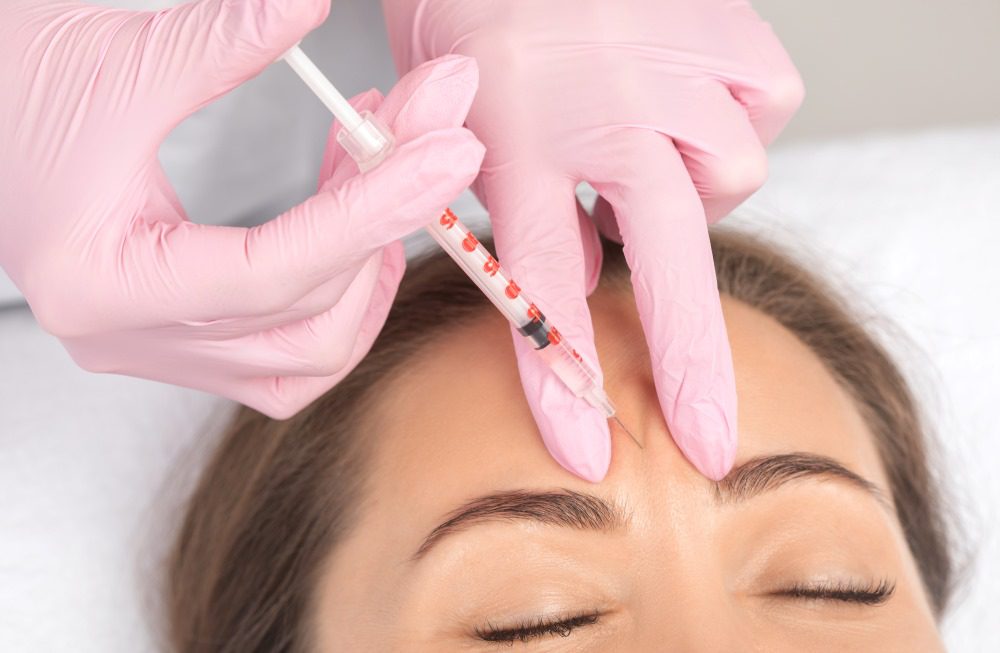Botox is very widely accessible and is many people’s go-to solution for reducing visible facial aging caused by fine lines and wrinkles. Despite its great popularity, periodically, concerns are raised about its potential to cause severe side effects, including even brain damage. This post will shed light on this claim and try to separate fact from fiction.
The Botox Product
Botox is actually extracted from a highly toxic neurotoxin derived from the botulinum bacterium. The extraction process refines and decontaminates the bacteria until it’s so highly diluted and purified that it’s considered safe to use in the very controlled circumstances of metered injections performed by trained practitioners.
Botox underwent a very strict and lengthy testing process before it became approved for cosmetic use. The US FDA (Food and Drug Administration) has classified Botox as approved for treating moderate to severe forehead lines, frown lines, and crow’s feet (fine lines at the corner of the eyes) in adults. Botox was initially approved for some medical purposes back in 1989; its approval for cosmetic use dates back to 2002.
Potential Botox Side-Effects
Along with almost any medication or cosmetic treatment, it is possible (although highly unlikely) for some patients to experience adverse reactions. Any chance of having unwanted side effects is minimized by going to a medically trained and experienced practitioner, preferably a doctor. They should go into your past medical history and be able to identify patients who might have an elevated risk of side effects. They can also quickly identify and treat any unwanted side effects that might develop.
When the correct dosages of Botox are used by a trained and qualified practitioner, Botox is considered very safe. Choosing a medical doctor as your practitioner is the best way to reduce any risks to the absolute minimum.
Botulinum and Brain Damage
The botulinum bacteria from which Botox is extracted is also the cause of botulism, a thankfully rare but very serious illness that can affect nerves throughout the body. It causes muscle weakness or even paralysis, which can impair breathing and can prove fatal in some cases.
Botulism symptoms generally start with muscle weakness around the face, mouth, and throat. They can also spread through the torso and out to the limbs.
Botulism results in muscle paralysis but does not affect the brain. The only way that botulism could have any effect on the brain is in extreme cases where respiration is so affected that blood supply to the brain is reduced to the point that brain damage is caused by lack of oxygen.
Legal and Illegal Botox
Botox is a protected trademark of Allergan Inc., which is part of the AbbVie company. They are the only source of Botox, and obviously have a very great interest in ensuring that the distribution of their product is limited to licensed professionals. Botox is not sold through any other channels.
There have been some reports of disreputable practitioners and backyard amateurs using illegal counterfeit copies of Botox, which were found to cause higher-than-normal rates of negative side effects.
Research has also identified some cases where the use of illegal Botox copies by amateur “practitioners” has resulted in subtle but detectable changes to brain function. Even these changes would not be classified as brain damage, although they’re certainly unwanted and very concerning.
When Botox is correctly administered, only extremely low concentrations are injected, and the effects are highly localized. That’s why Botox has to be injected at the precise location to affect adjacent muscles.
The conclusion is that there is absolutely no risk of any form of brain damage when Botox is injected with the correct dosage by reputable, licensed practitioners.
Two Interesting Findings
One research study has actually identified one very interesting area where having Botox can actually have the potential to change one’s interpretation of other people’s emotions. Apparently when we encounter others who project their emotions through facial expressions (happy, sad, angry, etc), we have the tendency to unconsciously mimic their expression. As Botox can inhibit our own ability to express emotions, this can actually have a subtle effect on our ability to interpret other people’s expressions.
Conversely, if Botox inhibits your ability to frown, it’s possible that it may also limit the extent to which you are depressed.
Your Laser Skin Care
Your Laser Skin Care practitioners are medically qualified and have extensive experience in performing Botox procedures. We also have extensive experience with a wide variety of other non-invasive cosmetic procedures. We can help you choose the safest, most effective, and most cost-effective way to achieve your cosmetic goals. Call us at (323) 525-1516 to schedule a free consultation, or visit us online for more information. Let us help you achieve your aesthetic goals with confidence.


